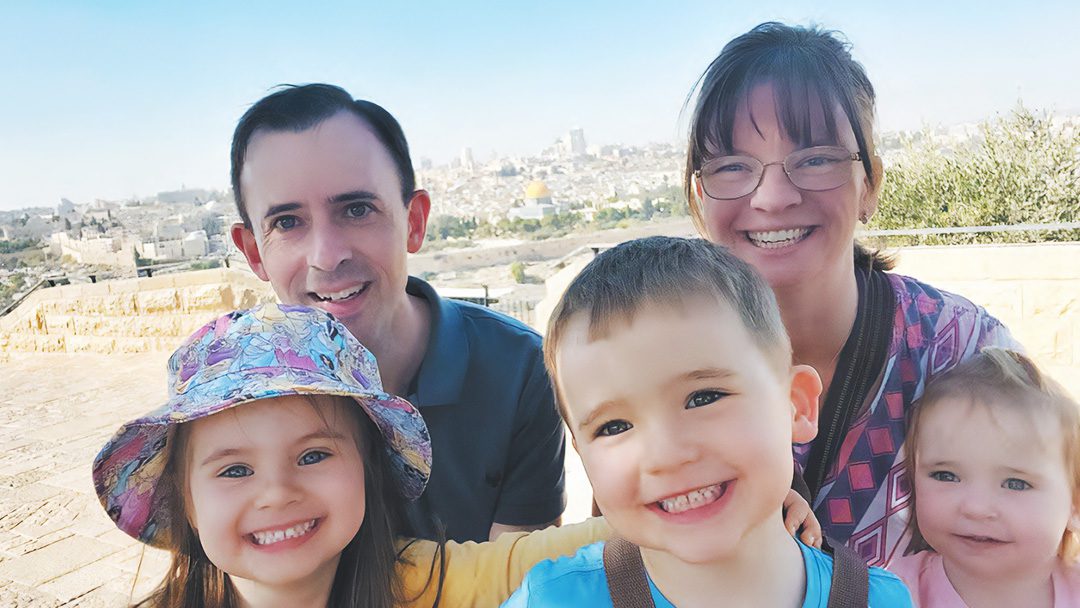‘Tell us a story Grandpa.’
I have seven beautiful grandchildren—six handsome grandsons and one stunning granddaughter. I love them with all my heart.
We chat all the time we are together—when we go camping and fishing and build go karts or collect insects or have a cup of tea in plastic cups or eat popcorn watching Mr Bean—but the thing I love to hear the most is when we sit down for our Friday night Shabbat meal and they say ‘Tell us a story Grandpa.’
And by story they mean a Bible story.
I will invariably launch into a child-friendly story from the current week’s Torah portion.
I keep the story pretty exciting; I use my hands, I use objects like the salt shaker, or my drink glass, and I keep the story moving along by asking lots of questions.
My last story involved me using the challah bread and a sharp knife. I said, ‘Who knows what ‘shinantam’ means?’ No one knew, so I took my knife in one hand and with the other I held the bread on my plate and began to cut off a slice. It was good challah—a bit tough—so the knife only went about a quarter of the way through on the first pass.
By this time all the little eyes were on the knife. As I made this first cut I said ‘‘Shinantam’ means ‘teach them’. God says to ‘teach His commands to your children’. When God says ‘teach them’ He says ‘shinantam’.’
‘But I want to tell you a little secret. ‘Shinantam’ doesn’t really mean teach them in the ordinary way. ‘Shinantam’ is like this knife cutting this bread. Did I cut through the bread with my first cut?’
‘No’ they all said.
‘Shall I try to cut some more?’
‘Yes’ they all shouted.
‘Ok I will—but as I do I want you to say ‘shinantam’ with me.’
So I ran the knife through the bread a second time and we altogether said ‘shinantam’. But the bread was tough and we were still not quite through.
‘Is the job done?’ I asked.
‘No’ they shouted laughing.
‘That’s because God doesn’t want us to teach His commands just once to our children; because the job would not be done. They wouldn’t understand it.
Rather He wants us to keep teaching a second time, and a third time. I need to keep cutting this bread till the job is done.’
‘What do you think? How many times should I keep teaching my children the commands of God?’ ‘Till the job is done’ they said. I have smart grandchildren.
‘Alright then, let’s keep cutting this slice of challah but each time I have to make a cut, you have to say ‘shinantam.’ I made two more cuts to the accompaniment of the children saying the word ‘shinantam’ and finally the knife did it’s trick and ‘voilà’ we had a slice of bread—which was promptly shared and gobbled up. This is how the Lord tells us we are to teach our children the Word of God. ‘Shinantam’.
Shinantam
Deuteronomy 4:7 And you shall teach them (shinantam) to your sons … In Hebrew this verse is said ‘V’shinantam l’vanecha’.
The term ‘shinantam’ is an interesting term. What do you think ‘shinantam’ means? It isn’t the normal term used to describe teaching. In fact the root word of shinantam is ‘shanan’ which is a verb meaning to ‘SHARPEN’ something. Wherever else it appears in the Bible it is translated ‘sharpen’, because it is related to the word ‘shen’—tooth. This is the only verse in the Bible where it is translated ‘teach’.
That’s why the Rabbi Rashi says:
“‘Shinantam‘ is an expression of SHARPNESS, meaning that these words should be sharply impressed in your mouth, so that if a person asks you something, you will not have to hesitate about answering him, but you will tell him immediately.”
– Rashi on Deuteronomy 6:7
The Rabbis grapple with the meaning of ‘shinantam’ in this verse. Rabbi Seforno believed that it meant to ‘teach your children with SHARP explanations that explain matters intelligently.‘
Rabbi Alshich believed that it meant that the words should ‘PENETRATE the listeners hearts like SHARP arrows’.
Rav Hirsch believed that it meant that one must ‘imprint it in SHORT, SHARP, CONCISE sentences.‘
Brown-Driver-Briggs, translates it to ‘teach the words INCISIVELY‘ meaning that the teaching effectively PENETRATES the listener!
Rabbi Ibn Ezra refers to a ‘SHARP arrow’ but says that the root word ‘shanan’ (sharpen), derives from a completely different root word ‘Shanah’ which means ‘REPEAT‘ from which we get the word ‘Mishnah’—so SHARPENING is produced by the means of REPETITIVE actions.
For example, instead of a sharp arrow piercing the listener, we are to focus on how the arrow is sharpened. A sharpening stone goes BACK AND FORTH over the arrow point repeatedly to make it sharp.
In other words, the instruction technique of ‘shinantam’ means teaching by REPETITION. We’ve all heard the saying that ‘repetition is the key to learning’.
Rashi says that the doubling of the letter ‘nun’ in v’shinantam implies using multiple repetitions (at least three) until the matter is familiar to the listener.
Another interpretation explains ‘shinantam’ as a way of teaching that ‘incises or engraves by incessant recitation and explanation.’
Even our English versions attempt to explain a term that doesn’t actually say ‘teach’, by saying things like ‘teach them diligently to your children’ (NKJV), ‘impress them on your children’(NIV), ‘get them inside your children’ (Message), ‘repeat them again and again to your children’ (NLT).
Are you getting the picture?
‘Shinantam’ doesn’t just mean ‘teach them’; ‘shinantam’ means a sharp, or piercing or repetitive type of teaching.
Can you think of where in the New Testament the Word of God is described in this way? You were right if you said Hebrews 4:12
‘For the word of God is living and powerful, and sharper than any two- edged sword, piercing even to the division of soul and spirit, and of joints and marrow, and is a discerner of the thoughts and intents of the heart.’
The Word of God must be taught thoroughly, repetitively, interestingly, meaningfully and over and over again until they get it.
My Disciples Are My Children & My Children Are My Disciples
The Lord doesn’t suggest that we teach our children His commands, He actually commands us.
Rashi reminds us that this scripture does not just refer to physical children, but also to spiritual children—disciples.
‘To your sons’—these are your disciples. We find everywhere that disciples are termed ‘sons’, as it is said: ‘You are children to the Lord your God’ (Rashi on Deut 6:7j)
Sifrei on Deuteronomy 6:7 ‘Teach them diligently to your children’, means to teach Torah to your disciples. We find that a man’s disciples are always called his children.
And if a man’s disciples are called ‘his children’, equally, a man ought to regard his children as ‘his disciples‘ and therefore must personally take the responsibility for raising them as disciples of Jesus and for teaching them the ways of the kingdom.
My son and daughter Kyal and Tash began their children’s Bible learning in earnest when the children reached the age of five. Their two eldest sons aged five and six, receive daily Bible teaching from the Torah with links to Jesus. That’s right, they learn the book of Leviticus too. These two boys are regular members of the weekly Saturday online Torah Portion.
Recently at school, my eldest grandson overheard two Christian preschool teachers say that they were considering doing something for Halloween. In his polite and respectful way, he said to them ‘Do you really want the Lord to turn His face away from you?’ They consequently didn’t do anything on Halloween and one of them reported back to Tash that she was learning the Bible from him.
Why don’t you make the commitment to prepare your children and grandchildren for the Kingdom like this. Perhaps you just said, ‘but I don’t know the Bible well enough?’
To Teach I Have To Be Prepared
One cannot teach unless he has learned. In order to be able to teach Torah, whether teaching his own children or teaching other students, he must FIRST study and learn himself. The institution of discipleship—teacher and disciple—is based upon the commandment to study Torah. The teacher must teach Torah diligently to his students, and the students must diligently learn from their teacher.
Here’s the secret—the Torah is learned from a teacher.
To this end, the apostle Paul’s teacher Gamliel said, ‘Acquire a teacher for yourself and remove all doubt.’ (Mishnah Avot 1:16)
We need credible teachers upon whom we may rely to teach us the Torah and in fact the whole Word of God. Jesus and His apostles ARE those teachers. You and I are Jesus’s disciples, and He is our teacher of Torah. As we study the words and ways of Jesus and His apostles, we are studying the Torah itself.
Rabbi Shammai urges: ‘Make the study of Torah a regular routine.’ (Mishnah Avot 1:15)
Rabbi Yose warns us, ‘Work hard to study Torah, for it is NOT something that you can inherit.’ (Mishnah Avot 2:12)
The study of Torah merits a reward both in this world and in the World to Come (Talmud Shabbat 127a).
Ultimately the study of Torah leads to the revelation of Jesus. Jesus said to the sages of His generation,
‘Search the Scriptures! … it is these that testify about Me‘ (John 5:39)
‘If you believed Moses (the Torah), you would believe Me, for he wrote about Me‘ (John 5:46)
Jesus Demonstrates Shinantam
Jesus demonstrates ‘Shinantam’ when He teaches his children about the Kingdom of God. His children were His disciples, and the people—His people—the children of Israel.
He used everyday stories—parables—to transmit Kingdom principles and he didn’t teach without them when He spoke to the crowds.
He asked questions—very, very good questions, like ‘What do you think?’
Matthew 18:12 “What do you think? If a man has a hundred sheep, and one of them goes astray, does he not leave the ninety-nine and go to the mountains to seek the one that is straying?”
Matthew 21:28 “But what do you think? A man had two sons, and he came to the first and said, ‘Son, go, work today in my vineyard.'”
Why not trying that simple question ‘What do you think?’ next time you teach the Word of God to someone.
In summation
You and I are commanded to teach the Word of God to our number one disciples, our children and grandchildren as well as our spiritual disciples.
To do so firstly requires dedicated study on our own part so that we are not ignoramuses in the Word, and secondly we must take every opportunity to teach it to them.
We must also become excellent teachers of the Bible by learning to become story tellers, who ask excellent and engaging questions and repeat the messages often, aiming to sink the message deep into the hearts of our listeners—our children, our disciples.
We are commanded to ‘Shinantam’.












0 Comments